 Petzlover
Petzlover Bracco Italiano is originated from Italy but Saarlooswolfhond is originated from Netherlands. Bracco Italiano may grow 8 cm / 3 inches shorter than Saarlooswolfhond. Both Bracco Italiano and Saarlooswolfhond are having almost same weight. Both Bracco Italiano and Saarlooswolfhond has almost same life span. Both Bracco Italiano and Saarlooswolfhond has same litter size. Both Bracco Italiano and Saarlooswolfhond requires Low Maintenance.
Bracco Italiano is originated from Italy but Saarlooswolfhond is originated from Netherlands. Bracco Italiano may grow 8 cm / 3 inches shorter than Saarlooswolfhond. Both Bracco Italiano and Saarlooswolfhond are having almost same weight. Both Bracco Italiano and Saarlooswolfhond has almost same life span. Both Bracco Italiano and Saarlooswolfhond has same litter size. Both Bracco Italiano and Saarlooswolfhond requires Low Maintenance.
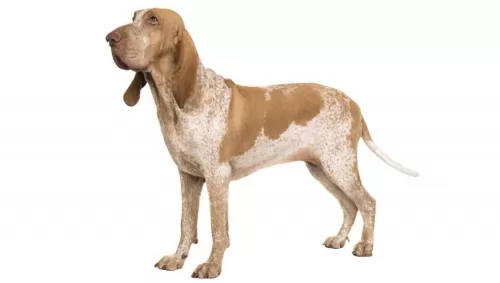 The attractive and popular breed in Italy, the Bracco Italiano was used for tracking and retrieving, evolving in Piedmont and Lombardy. It is believed the Bracco Italiano came about from crossing the Segugio with the ancient Asiatic Mastiff.
The attractive and popular breed in Italy, the Bracco Italiano was used for tracking and retrieving, evolving in Piedmont and Lombardy. It is believed the Bracco Italiano came about from crossing the Segugio with the ancient Asiatic Mastiff.
There are people however, who believe that the breed goes back to the St Hubert Hound, but it is certain that both hounds and gundogs are part of the breed’s ancestry. The dog only arrived in Britain in the last decade of the 20th century.
 Dutch breeder Leendert Saarloos began to breed German Shepherds to a European wolf. His goal was to bring out a dog that was more hard working.
Dutch breeder Leendert Saarloos began to breed German Shepherds to a European wolf. His goal was to bring out a dog that was more hard working.
The Dutch Kennel Club recognized this dog breed in 1975, and to give honor to the breeder, they gave the name to the dog - Saarloos Wolfdog. The dog was also recognized by the Federation Cynologique Internationale.
Today the Saarloos is regarded as a pet and companion. It was in 2015 that a study found that this dog showed more genetic association with the gray wolf.
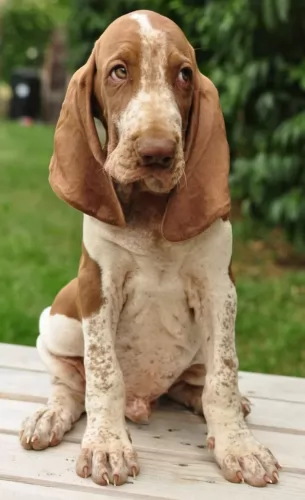 The Bracco Italiano is a large athletic, muscular dog. He stands at 58–67cm, weighing anything between 25 – 40kg. He reminds one somewhat of a German Short-haired Pointer. He has long ears and a serious expression, and this reminds one of a Bloodhound. He has short, shiny hair with his coat being white and chestnut or orange. The tail of the Bracco Italiano has always been docked, giving him an attractive, distinctive look but with rules and regulations coming in regarding docking, the long tail is often left intact. His eyes are brown.
The Bracco Italiano is a large athletic, muscular dog. He stands at 58–67cm, weighing anything between 25 – 40kg. He reminds one somewhat of a German Short-haired Pointer. He has long ears and a serious expression, and this reminds one of a Bloodhound. He has short, shiny hair with his coat being white and chestnut or orange. The tail of the Bracco Italiano has always been docked, giving him an attractive, distinctive look but with rules and regulations coming in regarding docking, the long tail is often left intact. His eyes are brown.
Braccos are wonderful pets – they are intelligent, loving, gentle and amicable, getting on well with children in the home as well as with other pets. Socialize and train them and they become gentle and obedient. They long to be involved with their human family and will adapt to life in the city or the country so long as they are made to feel like family. He is alert and makes a good watchdog. As with most other dogs, they can’t be bought, loved as a puppy and then ignored and left to themselves when they grow into adults.
 The Saarloos Wolfdog is a large dog standing at between 60–75cm male and female and weighing between 30 and 45kg. He is athletic and muscular with a short, dense coat. Colors are wolf-grey, white and red. The Saarloos has wolf-like expressions so the ears are erect, the muzzle pointed and the tail long and plumed. They eyes are a yellow color. The face is bright and alert, showing how intelligent he is.
The Saarloos Wolfdog is a large dog standing at between 60–75cm male and female and weighing between 30 and 45kg. He is athletic and muscular with a short, dense coat. Colors are wolf-grey, white and red. The Saarloos has wolf-like expressions so the ears are erect, the muzzle pointed and the tail long and plumed. They eyes are a yellow color. The face is bright and alert, showing how intelligent he is.
The Saarloos Wolfhound is full of energy so will be looking toward his owner to come up with good exercise for him.
A walk will always be welcome, but for such a lively dog, he’ll want something more energetic such as a hike, swimming, being allowed to run off his leash in the park and lots of vigorous ball- and rope games.
He is an independent dog and for this reason you’ll want him trained and socialized to make him obedient. He is loyal and loving but some of his wolf-like characteristics might mean that he isn’t a good choice for the first-time dog owner. If the first time dog owner is firm, consistent, strong and kind, then everything will be alright.
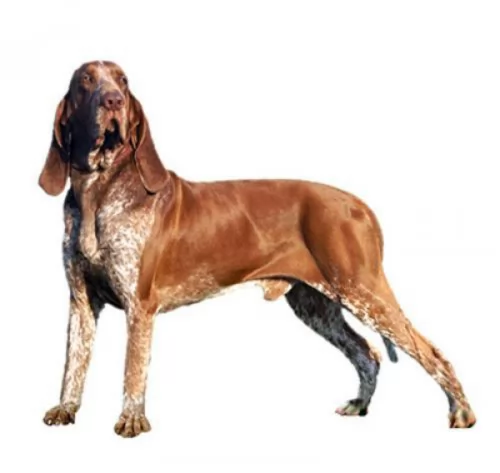 The gentle, amicable Bracco Italiano is a versatile dog that can be a super sport companion for active people and it can also be an exceptional companion for families and older people. He has a sweet, gentle expression and his amicable nature makes him easy to love. He is alert though, and therefore can be both protector and friend at the same time.
The gentle, amicable Bracco Italiano is a versatile dog that can be a super sport companion for active people and it can also be an exceptional companion for families and older people. He has a sweet, gentle expression and his amicable nature makes him easy to love. He is alert though, and therefore can be both protector and friend at the same time.
Overall, this easy going dog with his low maintenance coat can make an excellent 4-legged addition to any family.
 The Saarloos Wolfhound is a beautiful wolf-like dog that is full of life and energy. When you bring him into your life, you’re going to to have a wonderful addition to your family.
The Saarloos Wolfhound is a beautiful wolf-like dog that is full of life and energy. When you bring him into your life, you’re going to to have a wonderful addition to your family.
He is an independent dog that is strong-willed so it pays to have him trained and socialized, and then he becomes a balanced, well mannered dog that is loving and loyal with his beloved human family.
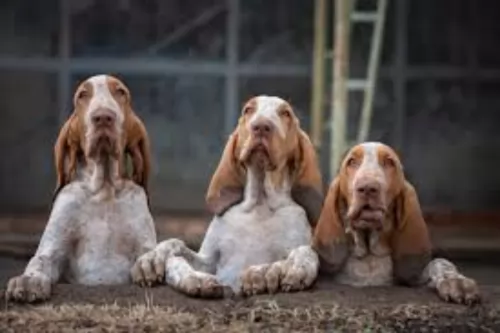 There don’t appear to be any major health issues with your Bracco Italiano and he can live to be 12, 13 or 14 years of age. Because he is a large breed however, you will need to watch out for hip dysplasia.
There don’t appear to be any major health issues with your Bracco Italiano and he can live to be 12, 13 or 14 years of age. Because he is a large breed however, you will need to watch out for hip dysplasia.
Hip dysplasia is a common skeletal disease with dogs and larger dogs have the genetic predisposition for hip dysplasia. Your dog can develop joint inflammation with pain and lameness.
Other health problems to look out for include kidney disease (Amaloidosis), cherry eye which results in dry eye. If you want to buy a Bracco Italiano, you should ask the breeder about the medical history of the parents.
 A well bred Saarloos Wolfhound is regarded as very healthy, and with good care they can reach up to 12, 13, 14 or 15 years of age.
A well bred Saarloos Wolfhound is regarded as very healthy, and with good care they can reach up to 12, 13, 14 or 15 years of age.
This is a common canine disease which comes about when a dog’s hip joints don’t develop properly. For a dog diagnosed with hip dyslasia it can be painful lying down and getting around.
Hip dysplasia is a genetic condition, but diet also plays a part as well as environmental factors. All dogs breeds are susceptible to hip dysplasia. Try and avoid your dog putting on too much weight as then it puts excessive strain on the joints. There are different treatment options to make it more comfortable for your pet.
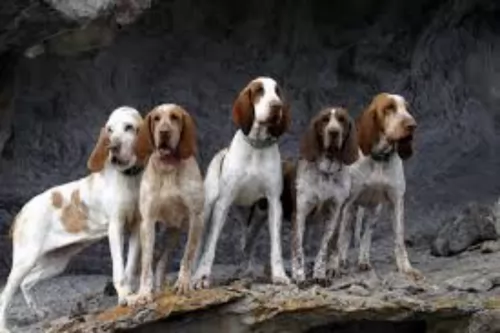 These dogs are moderate shedders so he will simply need a good brushing twice a week to ensure the coat is kept shiny and free from loose hairs. Nails should be clipped from time to time and he will also need to have his long ears checked for cleanliness. Long-eared dog breeds are more susceptible to canine ear infections.
These dogs are moderate shedders so he will simply need a good brushing twice a week to ensure the coat is kept shiny and free from loose hairs. Nails should be clipped from time to time and he will also need to have his long ears checked for cleanliness. Long-eared dog breeds are more susceptible to canine ear infections.
The Bracco is a large dog and therefore he will require a high quality, large-breed dog food formula. Your veterinarian can even recommend a quality commercially manufactured food for large, energetic dogs and which comes with all the vitamins and minerals required for such a breed.
Your vet will recommend you steer clear of foods with cheap fillers, lots of preservatives, sugar and colorants. He has a glossy, dense short coat and you want to ensure he gets raw meat, rice and vegetables from time to time to ensure that the beautiful coat never becomes dull and dry.
Cool, fresh water must always be available to him. Diet and nutrition is an important decision for your pet as it will ultimately affect his long term health.
 He’s an active dog so he will need a good dose of exercise to keep that muscular, lean look.
He’s an active dog so he will need a good dose of exercise to keep that muscular, lean look.
You will need to brush the dense double coat twice a week to ensure the removal of loose hairs and to keep the coat shiny and glossy. Trim his nails and check inside his mouth as he can’t tell you when he has a rotten tooth which can cause a lot of pain.
Feed puppies 4x a day.
Puppies 6 months on can have 2 meals a day.
Always feed your dog premium-quality dry food. Twice a week you can add home-made food to the dry kibble as a tasty treat. Add boiled chicken, brown rice or pasta and spinach, sweet potatoes and carrots. This food can all be chopped up and a portion added to the kibble. The rest can be frozen and then a portion warmed up for another meal.
Try and add some raw meat to his food occasionally as this helps to keep skin problems at bay.
Ensure there is always a bowl of fresh, cool water within his reach.
Your pet needs a warm, dry, comfortable place to sleep to call his own.
If your dog spends a lot of time outdoors, make sure there is both shade and sun.
Spaying and Neutering – beneficial if you don’t want puppies.
Vaccinations for puppies and adults to stave off deadly canine diseases.